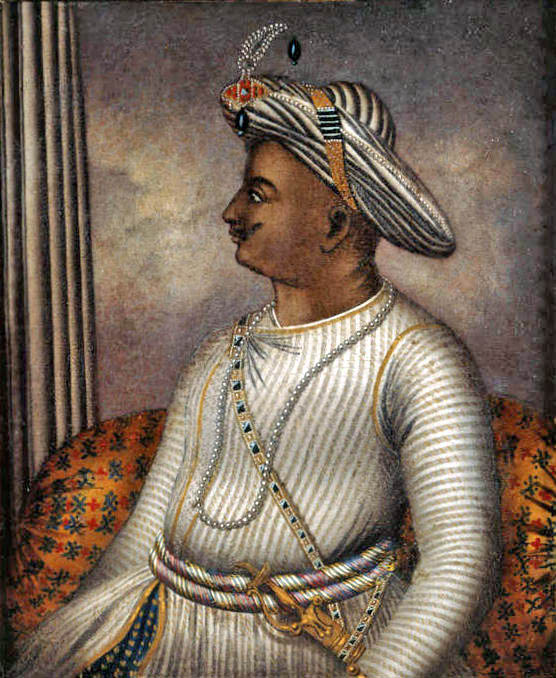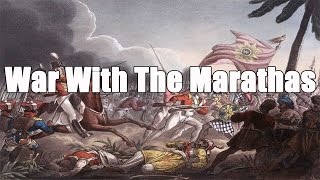Tipu Sultan and Marathas

Tipu Sultan and Marathas- Tipu Sultan ruler of Mysore gave a tough fight to British in the second half of 18th century. The territorial expansion by Hyder Ali and the increase in strength of Marathas alarmed the company. Between 1769-1799, the east India company fought four Mysore wars to crush Hyder Ali and Tipu Sultan. Hyder Ali won the first Mysore war. but however the second on was won by British.
Hyder Ali died soon after the defeat in the second Mysore war. His son Tipu Sultan took over the reigns and continued to fight against British until peace was made. The company along with Marathas and Nizam of Hyderabad entered into an alliance to defeat Tipu Sultan. With this defeat Tipu had to pay huge fine to British and also send his two sons as hostages to British camp. Tipu Sultan later on refused to accept the subsidiary alliance.
This led to the fourth Mysore war, where the Nizam joined hands with British to defeat Tipu Sultan. Tipu Sultan died in the year 1799 and fighting bravely against the British. Later the British annexed large parts of Mysore and gave to Nizam to rule as a gift for his co-operation. The new ruler accepted the subsidiary alliance and the Tipu's family was exiled to Vellore.
Marathas were very strong and was a great threat to British. However,
on seeing the lack of unity among the Marathas, the British interfered in the
internal affairs of Marathas. This led to the three important Anglo Maratha
wars from 1775-1818 which eventually gave a large part of control in southern
India to British. With no strong ruler in Marathas the British became the
unquestioned ruler.
Maratha wars

Due to continuous interference of the British in the internal affairs the first Maratha war broke in the year 1775 which lasted till 1782. The war began with a treaty of Surat and ended with the treaty of Salabai. The British did not gain much from the first Anglo Maratha war. After the death of Madhav rao, his younger brother Narayan Rao succeeded him but however Narayan rao uncle Raghunath rao wanted to become Peshwa hence he succeeded in getting killed Narayan rao in through a coup. For this Raghunath rao took the help of British and signed the treaty of Surat in the year 1775.
As per treaty Raghunath rao ceded the places of Salsette and Bassiin to British. In return British promised to help Raghunath rao by providing around 3,000 soldiers to kill Narayan rao. But however the British Calcutta council rejected the treaty of Surat and sent col Upton to make a new treaty and promised Raghunath rao for pension. The Bombay government rejected the new treaty and gave refuge to Raghunath rao. A treaty of Salbai was signed in the year 1782 which recognised Madhav rao junior as the Peshwa and returned all his territories near west of Yamuna. Finally in the year 1782 peace was restored with not much gain for British.
The second Anglo Maratha war started in the year 1803. The main reason for the second Maratha war was the defeat of Peshwa Baji rao from the hands of Holkar, the ruler of Indore. Peshwa Baji rao signed a British protection treaty called as treaty of Basseiin in the year 1782. However the other Peshwa were against the treaty. On 30th December another treaty was signed by Daulat Scindia called as treaty of Surji- Anjangaon with the British. The British kept hostile against Holkar and forced Holkar to give up Tonk, Rampur and Bundi. But in the year 1804 Holkar army defeated British. The British were able to manage to keep Delhi. Finally a treaty of Rajpurghat was signed between British and Holkar in the year 1785.
The Third Anglo Maratha war(1817-1818)
The main cause for the third and the final Maratha war was Peshwa Baji Rao 2 tried to get all the Maratha chiefs together to fight against British. But Baji rao was defeated and was deposed to Bithur near Kanpur. The office of the Peshwa was abolished. The state of Satara was taken out from Baji rao territories and was kept under the rule of a descendant of Shivaji. Daulat rao Scindia was made to sign a treaty with British. It was called the treaty of Gwalior. From this treaty Scindia was made as a mere spectator. The British annexed all the territories and the Maratha chief’s ruled the kingdom at the mercy of British.
British gained many territories and amassed huge land and
became the ultimate political power in India. British started to take many decisions against
the Indian rulers and the Kingdoms. The Indian rulers became mere spectator and
puppet in British hands. All these and many factors led to revolt of 1857.
Update on coronavirus in India
Affiliate Disclosure:
If you make any purchase via a link on this site, I may receive a small commission with no added cost to you.


